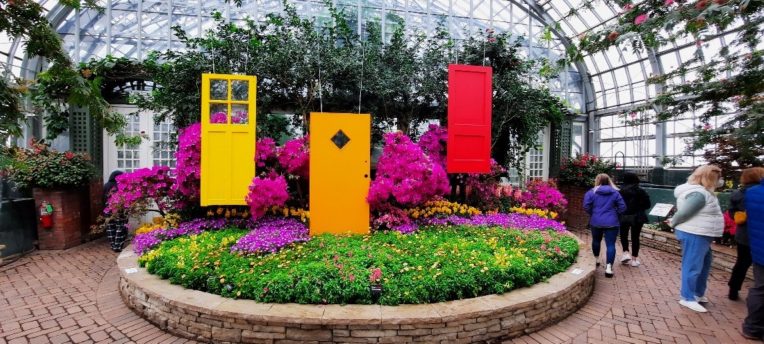Over the last two years, the ISU National Center for Urban Education (NCUE) has continued to provide culturally relevant urban experiences to faculty and students via virtual platforms. As venues slowly reopened to visitors across the country this spring, we have been able to offer in-person clinical trips in Chicago once again to our ISU campus community. This spring semester, four groups of faculty and students from across the University came up to immerse themselves in Chicago Public School classrooms as well as visit and learn about the assets and resources in NCUE partner communities.

In March, faculty and students from the School of Teaching and Learning (TCH) visited East Garfield Park and West Town. They earned clinical hours at Beidler and Talcott Elementary schools, experiencing a variety of classroom grade levels. In the afternoon, they expanded their teacher perspective seeing firsthand how schools and teachers work in collaboration with the community, stopping to visit a local art gallery (345 ART), Breakthrough FamilyPlex, and the Garfield Park Conservatory. The staff at these locations emphasized the importance of connection among schools, families, and community assets. At the end of the day, Gynger Garcia, NCUE community liaison at Breakthrough, facilitated a reflective debrief discussion. The most significant takeaway students shared was that they realized the community’s positive influence on student learning.

The next week, almost 50 students and faculty from the Wonsook Kim College of Fine Arts immersed themselves in six elementary and high schools across Little Village, Archer Heights, Brighton Park and Back of the Yards neighborhoods. They were able to assist in theatre, dance, art, and music classes at all levels. Dr. Judith Briggs, ISU Art professor, said: “Curie’s ARTivism classes showed the candidates that they could simultaneously engage their future students with contemporary art practices and social justice concerns. The candidates found the art and media teachers in all of the schools to be passionate, welcoming examples of the best of the teaching profession.”

In April, NCUE hosted two groups from the Special Education department (SED). The first group of Special Education majors from Dr. Carrie Anna Courtad and Dr. Mark Zablocki’s SED 342 courses visited the Auburn Gresham neighborhood. They observed in classrooms at Joplin, Westcott, and Cook Elementary schools and then toured St. Sabina’s campus, an anchor in the community. Mr. John Harris, youth mentor at the Ark of St. Sabina, and Ms. Melanie Christion, NCUE community liaison from Greater Auburn Gresham Development Corporation, facilitated a discussion including such topics as interacting with students who may have a different culture from yours and viewing a community with an asset-based lens. ISU students then got to role play various scenarios they might encounter with their future students.

Most recently, Dr. Allison Kroesch brought her students from the SED 344 course to Albany Park, a Chicago neighborhood that holds the distinction as one of the most diverse zip codes in the country. Many of the future teachers in this group are not special education majors and take the SED course to learn inclusion strategies for students with special needs. Their school visits focused on experiencing different classrooms to see firsthand various techniques used in successful co-teaching practices. After their morning observations, Ms. Marlen Rosas and Mr. Jose Rodriguez, deans at Roosevelt High School, shared the framework and application of restorative practices. Ms. Maddie Palovick, NCUE community liaison from North River Commission, then painted a picture of the cultural diversity in the neighborhood. Finally, students went to Albany Park Theater Project and learned how community organizations work in collaboration with the schools and families to support the local young people. Student Mark Grandos remarked about the experience of being at Roosevelt High School on the Day of Silence (a day that supports the LGBTQIA community) noting his main takeaway “was the social activism amongst the students.”

After participating in these community-integrated clinical experiences, ISU teacher candidates from all four groups said that their cultural understandings increased, they gained a greater appreciation for the richness of the various communities that surround schools, and they better understood the importance of teachers connecting with community members and organizations to truly know and support their students. ISU colleges and departments interested in planning meaningful school and community experiences with NCUE can reach out to Dr. Maria Luisa Zamudio-Mainou, executive director.

